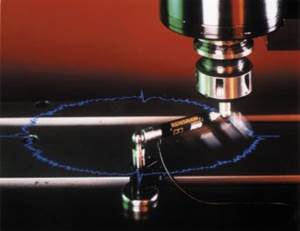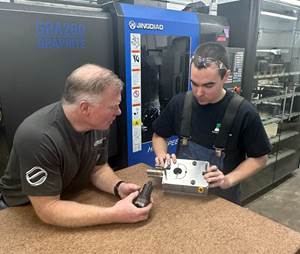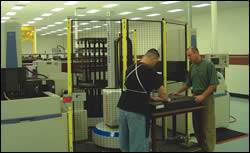Scott Peters: Plastics Personified!
This distinguished industry veteran has spent more than three decades contributing to the moldmaking industry—receiving mounds of recognition for his efforts.
For more than 30 years Scott Peters has been working in the moldmaking industry wearing many hats, including apprentice, mold designer, sales engineer, and engineering manager—in addition to serving on a number of advisory boards, including SPE’s. It’s no surprise that his colleagues at SPE unanimously chose him as the 2007 Mold Designer of the Year Award from the organization’s Moldmaking and Mold Design Division. This prestigious award is just one of many notches in his toolmaking belt and brings Peters’ career full circle.
Currently the tooling/process engineering manager at HunterDouglas (Owensboro, KY)—a manufacturer of window fashions—Peters wasn’t actually bitten by the moldmaking bug until he was an adult. After a short stint in the Marine Corps and bouncing from one dead-end job to another post-high school, it was actually his mother who urged him to answer a Classified ad for Monogram Models she found in a suburban Chicago, Illinois newspaper. “I needed a career,” Peters recalls. “In addition to the military, I went to a junior college for agricultural marketing and found that commodities trading was not going to be my claim to fame. I had worked in shipping/receiving and done all kinds of things, but it wasn’t anything that was going to put bread on the table. When my mother saw the ad, she had been talking to Don Starkey, Sr. (founder of Progressive Components) since he and my father had apprenticed together. He told her that if I got into Monogram I could pretty much write my own ticket. He was right. Things have worked out quite well for me!”
His Career Path
Peters embarked on his moldmaking career in 1976 at Monogram Models (Morton Grove, IL)—a manufacturer of model cars, boats and airplanes. He worked for Jack Barrens and Larry Liese. “Larry taught me drafting,” Peters notes. “My first design was fondly referred to as a ‘Pig Pen’ drawing because of all the smudged graphite on the page. Things had to improve quickly as we were designing 26 new molds a year all on drafting boards. Larry was patient with me and taught me the craft of good drafting. I had gone to a college prep high school that had zero shop courses. I look back at geometry, trigonometry, algebra—and I barely passed those courses—and here I am an engineering manager. Figure that one out! From there I learned the business.”
Peters believes that you can learn by doing or learn by observing. “Both provide valuable lessons and will really round out the individual,” he explains. “I read everything I can find on subjects. Right now team leadership is high on my reading list—I want to be the best I can at any given task, but realize that I cannot do it alone. The key is to ‘keep your ears open and your mouth shut’ so that you can take it in and learn, then apply it to your life and improve.” Considering himself a lifelong student, Peters is looking to earn a degree in Practical Ministries to further his development as a Minister. At age 52 he is looking at attending college!
Peters spent a year and a half at Monogram. Then, he decided a change of scenery was in order and moved out to the west coast. He landed a job as assistant supervisor of Los Angeles-based Revell—another manufacturer of model cars and boats that is now a part of Monogram Models. He spent another one and a half years at Revell, got married, and then wanderlust struck again. “I wanted to see the world with my bride!” Peters states. “So we moved to Fresno and I got a job at a company called Manlift, which was a slight departure from plastic molds. They did structural weldments—the aerial work platforms and scissor lifts found in factories. I was their tool designer and once again learned on the job. It was a lot of fun because I was learning how to do crane certifications and strengthen materials. There were a number of engineers who shared their knowledge with me.”
After about six months at Manlift, Peters felt “uncomfortable putting an engineer’s certification on a crane that someone would pick up 4 to 6 tons of steel with and potentially drop on an employee in the manufacturing area” so he picked up and moved back to Chicago. Soon, he found employment in the Windy City at Empire Mold Engineering, a division of Northwestern Tool and Die Manufacturing—then located in Skokie, IL. It was there he completed his formal apprenticeship program. Peters recounts, “It was a lot of work—raising children, attending night school for ‘Related Theory Classes’ and working 50 to 60 hours per week. I credit Norbert Stengel (owner) with a great deal of the mechanical tooling ability that I have today.” As a side note, Peters is the third individual to receive either the Moldmaker or Mold Designer of the Year Award out of the Northwestern family. “This speaks volumes,” Peters says, “about the system of training that Norbert Stengel has put in place.”
|
Mold Designer of the Year Award The awards give each winner five hundred dollars, which will be donated on their behalf to a technical school of their choice. The following information briefly outlines the criteria for the awards: Candidates for Nomination
All candidates are reviewed by SPE’s board. Please visit its website at www.4spe.org for more information. |
After four years at Northwestern (earning his Journey Level Credentials with prior work experience credit and approximately 8,000 hours of on-the-job training), Peters was hired by small medical company called Hollister Inc. (Libertyville, IL) as a corporate-level manufacturing engineer. He enjoyed the plant level responsibilities he had and spent five years there before moving onto to D&L Components (now Progressive Components). He was Don Starkey Sr.’s first sales engineer. The two parted ways eight months later and Peters went south to work for Ft. Lauderdale, FL-based Global Precision—a producer of snap top closures. A desire for another change in scenery led Peters to Ohio approximately two years later, where he served as a regional sales engineer for HASCO, a German mold base manufacturer based in Lincoln Park, NJ.
Three years later, HASCO closed its eastern operation and moved to the west coast. Peters landed at Ewikon Hot Runners—another German transplant company located in suburban Chicago, IL as a regional sales engineer, where he worked for three years. After that, he spent the next 12 years of his life at Cuyahoga Falls, Ohio-based Pro Mold—a mold design and build firm—as sales and engineering manager. While he was there he helped start up an internet-based graphite sales company called E-Trode, Inc.; and started his own marketing company called Molded Marketing LLC. “I saw this as a way to help moldmakers develop a branded image and improve their business model. Unfortunately I don’t do very much with it at this time because I am working too many hours!” Peters laughs.
Peters left Pro Mold to work for HunterDouglas. He has been with the company for just under two years. “Shortly after coming to HunterDouglas, I was given the opportunity to not only manage the tooling and tooling/engineering function but also all of the process engineering functions so I have my hands full,” he notes. Currently he manages tooling in both the HD-Owensboro facility and the HD-China plant in Guangzhou, China.
Setting Industry Standards
In addition to the plethora of companies Peters has worked for and the positions he has held, he also belongs to a number of associations as well as holding a number of positions and serving on a number of advisory boards. It is his way of giving back to the industry that has provided him with his livelihood over the years (see A Robust Résumé below).
Several years ago, Peters was part of an Expert Panel through his membership in the National Institute of Metalworking Skills (NIMS) board. “This panel was embodied by the NIMS to revitalize the apprenticeship standards for metalworking apprentices throughout the U.S.,” he explains. “As a result, the work/output was certified by the U.S Department of Labor as a new National Guideline Standards for Apprenticeship. Today we have a skills-based apprenticeship standard as well as a time- and grade-based apprenticeship standard. The skills-based standard brings additional merit to an apprenticeship because the apprentice not only receives credit for ‘time served’ but has to demonstrate—through testing and performance standards—that he/she can really do the job. I believe this holds a higher value than the time- and grade-based standard.”
Peters is on another NIMS panel working on a master level accreditation for metalworking trainees. “It’s kind of like a ‘train the trainer accreditation” so a senior toolmaker can go back and apply what he has learned to train apprentices,” he elaborates.
In addition to winning SPE’s award, Peters was inducted into the Plastics Pioneers in September 2007—a philanthropic organization that raises money for industry schools. “There are currently only 232 active members with a cap of 250 per the by-laws,” Peters says. “It is a pretty prestigious group and I am honored to be counted as one of them.”
Living His Dream
Peters has lived both his professional and personal life to the fullest extent. He has been named in Who’s Who in Plastics and Polymers and the American Registry of Outstanding Professionals. He also is an ordained minister who has preached in his own church and in jails. “You learn a lot as you go through life, but if you reach the point in your career where you think you have learned all there is, you start dying,” he states. “I continue to learn daily from my colleagues in the SPE and from the people I work with. Every day is a new learning experience. I value the people I’ve been able to meet and work with in my more than three decades worth of work in the plastics industry. It’s really been a great career path for me and I highly recommend it to anyone who doesn’t know what they want to do when they grow up!”
Winning the SPE 2007 Mold Designer of the Year Award is further validation to Peters that he chose the right career path all of those years ago. “We are told throughout our lives that if we work hard and apply ourselves, we will reap a great reward,” Peters emphasizes. “Being named SPE Mold Designer of the Year is both an especially great reward and a humbling experience. This is something that your colleagues do for you—recognizing what you have done for the industry. I am in their debt for having been given the opportunity to serve our business and humbled by their recognition of the things that they allowed me to accomplish.”
In his own words, Peters plans to “work at HunterDouglas until I am 70 and then retire—I hope! Then I will return to ministry until the day I die, as that is what I enjoy the most in my life.”
|
A Robust Résumé
|
Related Content
The In's and Out's of Ballbar Calibration
This machine tool diagnostic device allows the detection of errors noticeable only while machine tools are in motion.
Read MoreIntegrated CAD/CAM Streamlines Electrode Manufacture, Improves Quality
A focus on electrode design and automation helps toolroom improve efficiency, reduce tooling costs and deliver higher quality products.
Read MoreLaser Welder Yields Fast, Precise Mold Repair
Intralox's integration of the Alpha Laser ALFlak has significantly improved their tool room efficiency when it comes to difficult welds and urgent repairs.
Read MoreFive-Axis Graphite Mill With Automation Debottlenecks Electrode Machining
Five-axis electrode cutting enabled Preferred Tool to EDM complex internal screw geometry on an insert that otherwise would have had to be outsourced.
Read MoreRead Next
Steve Hoare: Flying High as SPE’s 2006 Moldmaker of the Year
Kudos to this shining example of perseverance and determination in sustaining a business during hard economic times.
Read MoreAre You a Moldmaker Considering 3D Printing? Consider the 3D Printing Workshop at NPE2024
Presentations will cover 3D printing for mold tooling, material innovation, product development, bridge production and full-scale, high-volume additive manufacturing.
Read MoreHow to Use Continuing Education to Remain Competitive in Moldmaking
Continued training helps moldmakers make tooling decisions and properly use the latest cutting tool to efficiently machine high-quality molds.
Read More







.jpg;maxWidth=300;quality=90)













